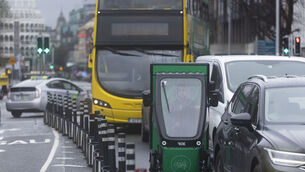America on a rocky and uncertain road

The Greyhound bus driver used her sweetest sing-song voice in making the appeal over the public address system.
“Turn off your moo-vie,” she twittered. “Especially the language that is not appropriate for being on a bu-us.” Her appeal, to a passenger talking loudly on his mobile, was heard by everyone but him.
















